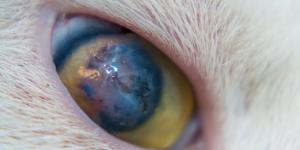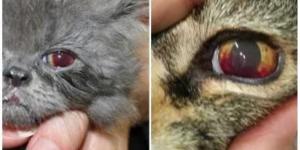My Cat Has Puffy Eyes - Causes and Treatment



See files for Cats
The state a our cat's eyes are a good indicator of their overall health. Fortunately, most cats have large and expressive eyes which make it easier to determine their quality. However, if we see their eyes are swollen and puffy, it is an immediate cause for concern. Swelling and puffiness are due to inflammation. Inflammatory process are often related to infection, but they may also be related to other health problems which make them more susceptible to infection. Immunosuppressive diseases and conditions are some of the most common.
At AnimalWised, we look at why my cat has puffy eyes. If your cat's eyes are swollen and watering, we provide the main potential causes of this condition, as well as looking at what treatment options may be available.
Why are your cat's eyes puffy?
Swelling of a cat's eyes are usually due to ocular inflammation, something which can be related to a wide range of diseases. However, since inflammation is caused by the body's immune response to being attacked, this is usually due to fighting microorganisms such as bacteria, but can also be the result of viral agents or other issues. There is no single reason why a cat has puffy eyes and it can often be secondary to an underlying problem.
We explain the different causes of eye puffiness in felines in the sections below.
Conjunctivitis in cats
Red, swollen and rheumy eyes can be a symptom of conjunctivitis in cats. This is an inflammation of the membrane that covers the eye and the inside of the eyelids known as the conjunctiva. Another characteristic symptom of conjunctivitis is a swollen eyelid or the appearance of the third eyelid in cats. Although it is usually diagnosed more frequently in newborn cats and kittens, it can affect felines of all ages and breeds.
Conjunctivitis in kittens can be associated with different causes, almost always deriving from an underlying inflammatory or infectious process. Below, we summarize the main causes of conjunctivitis in cats:
- Allergies
- Respiratory problems (often associated with feline rhinotracheitis)
- Uveitis in cats
- Viral and bacterial infections (often associated with feline herpesvirus and chlamydiosis)
- Systemic hypertension
- Injuries and trauma to the cat's eye (cuts, hits, fights, etc.)
- Cancer
- Hereditary problems that affect eye structure
Conjunctivitis in cats must be treated appropriately and swiftly to prevent symptoms which can threaten the sight and even the life of the cat. It is also a highly contagious condition which require individuals to be separated until the treatment is completed. If your cat has swollen, wet and/or rheumy eyes, you should immediately take them to a veterinary clinic.
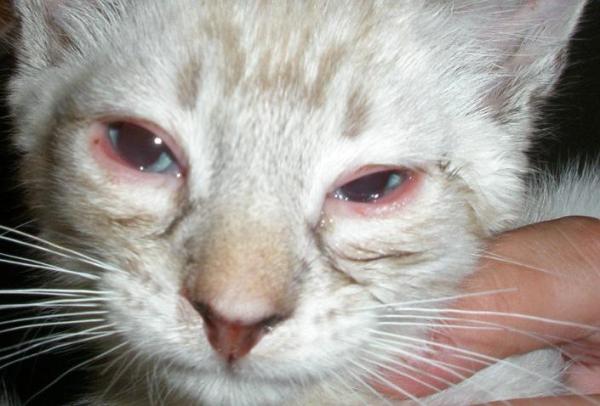
Allergies in cats
In addition to being puffy and swollen, if your cat's eyes are itchy, it may be a sign of allergies. We notice this if the cat frequently tries to scratch the eye region and nose. Symptoms of allergies in cats include coughing, skin inflammation, sneezing, vomiting and diarrhea. Secretions from the mouth or nose may also occur. This can be seen if the cat has a lot of eye discharge.
Allergies in cats result in an exaggerated reaction by their immune system after exposure to certain agents (allergens) their body interprets as potentially harmful. As with humans, cats can be allergic to a lot of things, depending on the organism of each feline.
The allergens that most commonly cause allergies in cats are:
- Plants
- Mold or fungus
- Pollen
- Fragrances
- Alcohol
- Food (eggs, chicken, rice, soybeans, corn, fish, etc.)
- Tobacco smoke
- Insecticides (flea products, mosquito repellants, etc.)
- Cleaning products (especially those with a very strong aroma)
- Insect bites (fleas, mosquitoes, bees, ticks, etc.)
To rule out the possibility that your feline is allergic to something, you can consult your veterinarian about allergy tests for cats. This may involve a trial and error process of removing certain allergens until the reactions stop. This way, you can avoid feeding them food or using products that can cause an overreaction in their immune system.
Feline uveitis
Uveitis in cats is a range of inflammatory processes that affect the feline uvea. The uveal tract (simply known as the uvea) is a vascular layer that is the main protective barrier of the eye. It is responsible for the production of aqueous humor that lubricates the eyeball. Depending on the region of the uveal tract that is affected by the inflammation, we will have anterior, intermediate or posterior uveitis.
Currently, about 70% of feline uveitis cases develop as a consequence of severe systemic pathologies. These include FIV (so-called ‘feline AIDS’), feline leukemia and systemic toxoplasmosis. Inflammation of the uvea can also result from wounds and injuries resulting from fights with other animals, accidents or trauma.
One of the characteristic signs of feline uveitis is when a cat closes only one eye, since the disease causes pain, hypersensitivity and photophobia. In more advanced cases, a caregiver may identify the cat's eye changes color, has spots on the eyeball or the cat's eye is cloudy. When you perceive any of these symptoms in your cat, do not hesitate to go to a veterinary center.
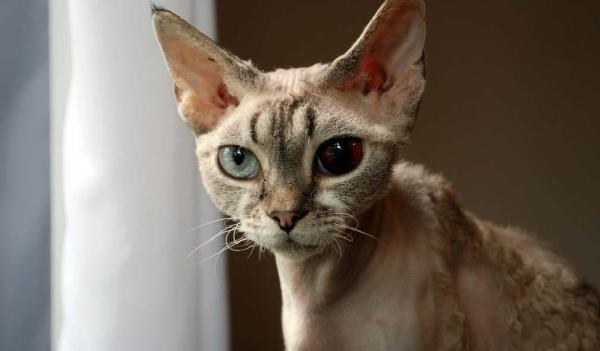
Corneal ulcer
If your cat's eyes are not only puffy, but they are unable to open them, it may be due to a corneal ulcer. An ulcer on the cornea usually derives from poorly treated conjunctivitis or that which has not healed well for any reason. It is also associated with feline herpesvirus, injury or due to foreign bodies being introduced into the cat's eye.
The most common symptoms of a corneal ulcer in cats include:
- Excessive and very watery tearing (the cat's eye appears watery or cloudy from excess eye fluid)
- Photophobia (the light bothers than and they may only close one eye)
- Purulent discharge (the cat's eye has greenish flecks like pus)
- Itching (the cat will try to scratch the eye region with great intensity and frequency)
- Visible third eyelid (the third eyelid is visible in an attempt to protect the eye)
- Visible ulcers (if not treated quickly and correctly, the ulcer on the cornea becomes larger and can be seen with the naked eye)
If you observe these symptoms in your feline, you should go to a veterinary center to check the eye and establish the most appropriate treatment according to their state of health. Mild cases of corneal ulcer generally respond well to antibiotic treatment, but more advanced cases often require surgical intervention.
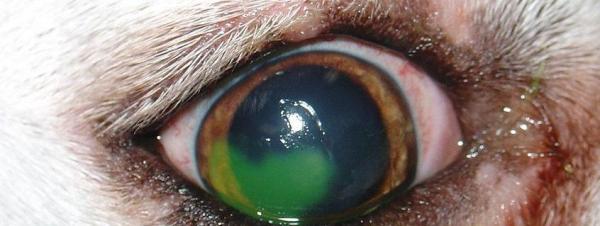
Foreign bodies
While this type of issues is more common in dogs, cats can also be affected by foreign bodies getting into their eyes. In this case, the agitation of the foreign body causes the swelling and excessive tearing occurs to lubricate the eye. This lubrication should help remove the foreign object, as well as to protect the tissue of the eye. You will likely see the cat repeatedly trying to scratch their eyes to relieve the discomfort and pain.
Any cat can be affected by the entry of a foreign body in their eye. It commonly occurs while playing, running or jumping around the home. Stray felines that are exposed to a lot of dirt and may rummage in unsanitary areas in search of food which can cause this problem. Domestic cats with inadequate hygiene in their environment are especially vulnerable to the introduction of some particle in their eyeball.
Good hygiene and organization at home are great allies in the prevention of various types of diseases and domestic accidents. In the case of suspecting a feline has a foreign body in their eye, we will need to go to the vet. They can examine the exact location and rule out any other problems. Trying to remove it ourselves can be very dangerous and may result in the cat losing sight in the eye. Antibiotics may also need to be administered to fight secondary infections.
Foreign bodies can cause damage that results in blood entering the eye (known as hyphema). Learn more with our article on why a cat has blood in their eye.

This article is purely informative. AnimalWised does not have the authority to prescribe any veterinary treatment or create a diagnosis. We invite you to take your pet to the veterinarian if they are suffering from any condition or pain.
If you want to read similar articles to My Cat Has Puffy Eyes - Causes and Treatment, we recommend you visit our Eye problems category.



